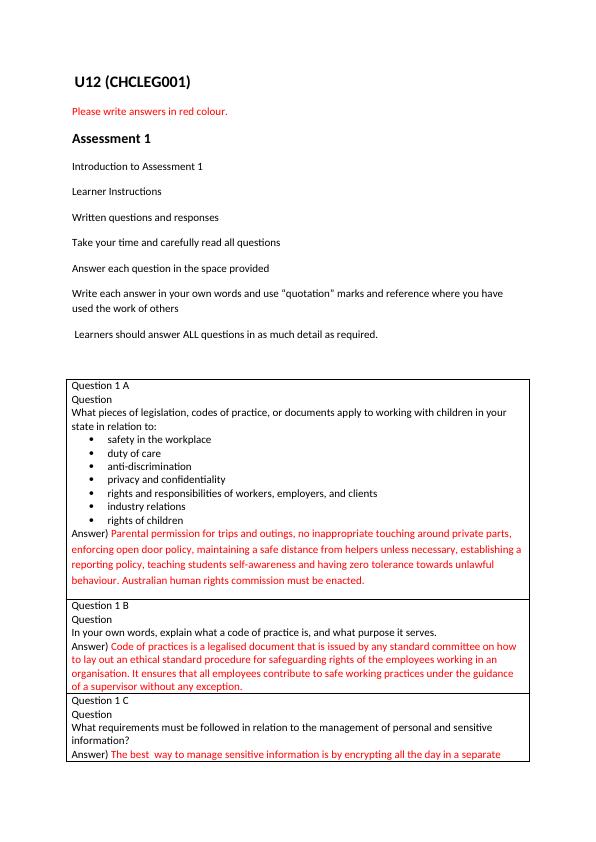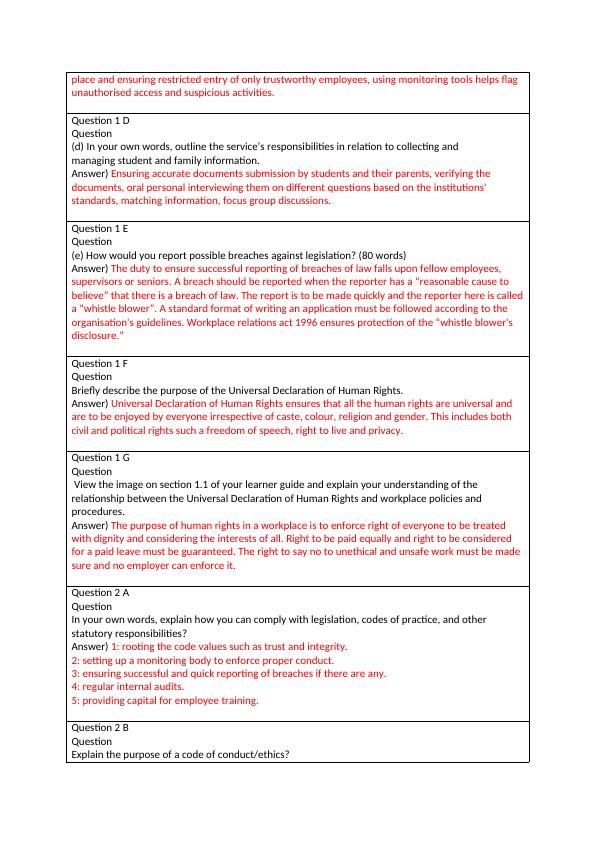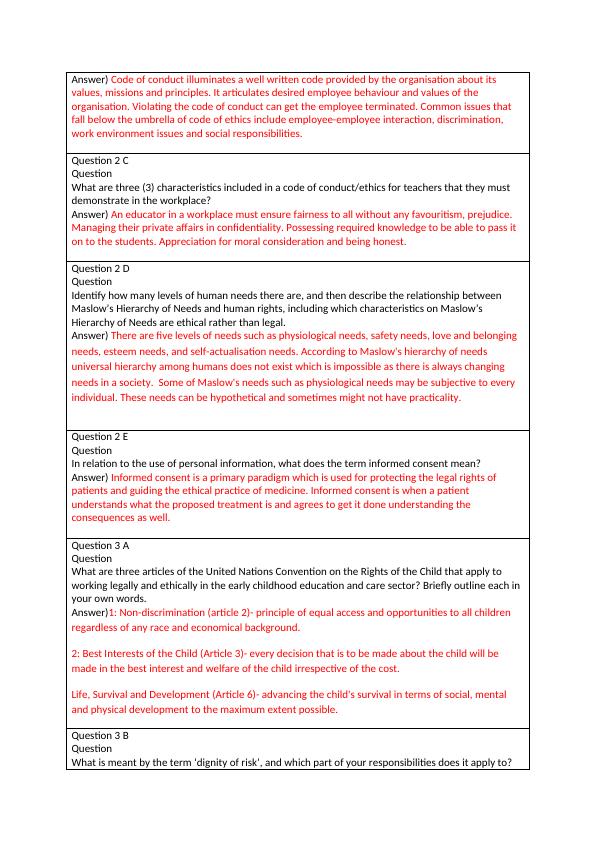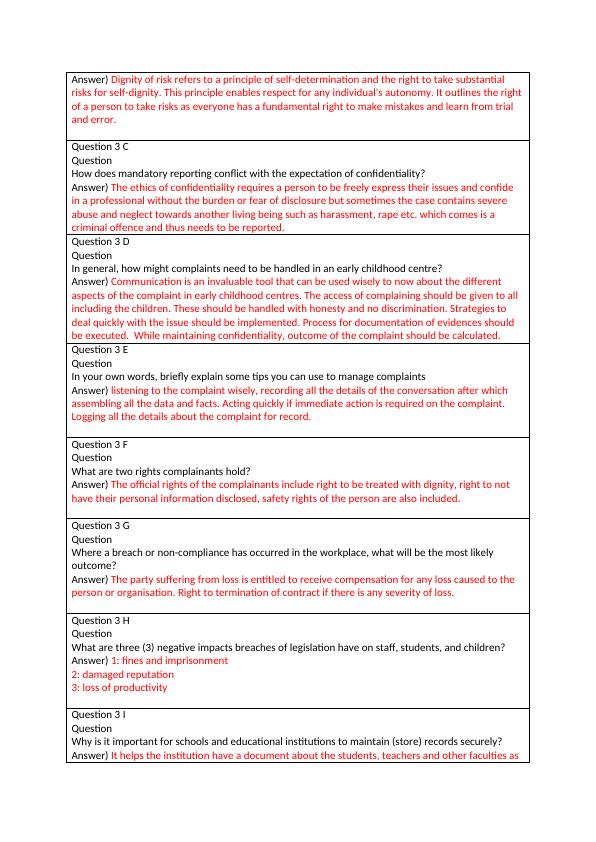Assessment 1: Legislation, Codes of Practice and Documents in Early Childhood Education
11 Pages5072 Words373 Views
Added on 2023-06-10
About This Document
This assessment covers the legislation, codes of practice and documents that apply to working with children in relation to safety, duty of care, anti-discrimination, privacy and confidentiality, rights and responsibilities of workers, employers, and clients, industry relations, and rights of children. Learners are required to answer written questions in detail and in their own words, and reference any work of others. The assessment also covers the Universal Declaration of Human Rights, Maslow's Hierarchy of Needs, and the consequences of breaching the Code of Conduct. Learners are also required to identify legal issues that may arise in an educational facility and explain how to maintain confidentiality of families and children.
Assessment 1: Legislation, Codes of Practice and Documents in Early Childhood Education
Added on 2023-06-10
ShareRelated Documents
U12 (CHCLEG001)
Please write answers in red colour.
Assessment 1
Introduction to Assessment 1
Learner Instructions
Written questions and responses
Take your time and carefully read all questions
Answer each question in the space provided
Write each answer in your own words and use “quotation” marks and reference where you have
used the work of others
Learners should answer ALL questions in as much detail as required.
Question 1 A
Question
What pieces of legislation, codes of practice, or documents apply to working with children in your
state in relation to:
safety in the workplace
duty of care
anti-discrimination
privacy and confidentiality
rights and responsibilities of workers, employers, and clients
industry relations
rights of children
Answer) Parental permission for trips and outings, no inappropriate touching around private parts,
enforcing open door policy, maintaining a safe distance from helpers unless necessary, establishing a
reporting policy, teaching students self-awareness and having zero tolerance towards unlawful
behaviour. Australian human rights commission must be enacted.
Question 1 B
Question
In your own words, explain what a code of practice is, and what purpose it serves.
Answer) Code of practices is a legalised document that is issued by any standard committee on how
to lay out an ethical standard procedure for safeguarding rights of the employees working in an
organisation. It ensures that all employees contribute to safe working practices under the guidance
of a supervisor without any exception.
Question 1 C
Question
What requirements must be followed in relation to the management of personal and sensitive
information?
Answer) The best way to manage sensitive information is by encrypting all the day in a separate
Please write answers in red colour.
Assessment 1
Introduction to Assessment 1
Learner Instructions
Written questions and responses
Take your time and carefully read all questions
Answer each question in the space provided
Write each answer in your own words and use “quotation” marks and reference where you have
used the work of others
Learners should answer ALL questions in as much detail as required.
Question 1 A
Question
What pieces of legislation, codes of practice, or documents apply to working with children in your
state in relation to:
safety in the workplace
duty of care
anti-discrimination
privacy and confidentiality
rights and responsibilities of workers, employers, and clients
industry relations
rights of children
Answer) Parental permission for trips and outings, no inappropriate touching around private parts,
enforcing open door policy, maintaining a safe distance from helpers unless necessary, establishing a
reporting policy, teaching students self-awareness and having zero tolerance towards unlawful
behaviour. Australian human rights commission must be enacted.
Question 1 B
Question
In your own words, explain what a code of practice is, and what purpose it serves.
Answer) Code of practices is a legalised document that is issued by any standard committee on how
to lay out an ethical standard procedure for safeguarding rights of the employees working in an
organisation. It ensures that all employees contribute to safe working practices under the guidance
of a supervisor without any exception.
Question 1 C
Question
What requirements must be followed in relation to the management of personal and sensitive
information?
Answer) The best way to manage sensitive information is by encrypting all the day in a separate

place and ensuring restricted entry of only trustworthy employees, using monitoring tools helps flag
unauthorised access and suspicious activities.
Question 1 D
Question
(d) In your own words, outline the service’s responsibilities in relation to collecting and
managing student and family information.
Answer) Ensuring accurate documents submission by students and their parents, verifying the
documents, oral personal interviewing them on different questions based on the institutions'
standards, matching information, focus group discussions.
Question 1 E
Question
(e) How would you report possible breaches against legislation? (80 words)
Answer) The duty to ensure successful reporting of breaches of law falls upon fellow employees,
supervisors or seniors. A breach should be reported when the reporter has a “reasonable cause to
believe” that there is a breach of law. The report is to be made quickly and the reporter here is called
a “whistle blower”. A standard format of writing an application must be followed according to the
organisation's guidelines. Workplace relations act 1996 ensures protection of the “whistle blower's
disclosure.”
Question 1 F
Question
Briefly describe the purpose of the Universal Declaration of Human Rights.
Answer) Universal Declaration of Human Rights ensures that all the human rights are universal and
are to be enjoyed by everyone irrespective of caste, colour, religion and gender. This includes both
civil and political rights such a freedom of speech, right to live and privacy.
Question 1 G
Question
View the image on section 1.1 of your learner guide and explain your understanding of the
relationship between the Universal Declaration of Human Rights and workplace policies and
procedures.
Answer) The purpose of human rights in a workplace is to enforce right of everyone to be treated
with dignity and considering the interests of all. Right to be paid equally and right to be considered
for a paid leave must be guaranteed. The right to say no to unethical and unsafe work must be made
sure and no employer can enforce it.
Question 2 A
Question
In your own words, explain how you can comply with legislation, codes of practice, and other
statutory responsibilities?
Answer) 1: rooting the code values such as trust and integrity.
2: setting up a monitoring body to enforce proper conduct.
3: ensuring successful and quick reporting of breaches if there are any.
4: regular internal audits.
5: providing capital for employee training.
Question 2 B
Question
Explain the purpose of a code of conduct/ethics?
unauthorised access and suspicious activities.
Question 1 D
Question
(d) In your own words, outline the service’s responsibilities in relation to collecting and
managing student and family information.
Answer) Ensuring accurate documents submission by students and their parents, verifying the
documents, oral personal interviewing them on different questions based on the institutions'
standards, matching information, focus group discussions.
Question 1 E
Question
(e) How would you report possible breaches against legislation? (80 words)
Answer) The duty to ensure successful reporting of breaches of law falls upon fellow employees,
supervisors or seniors. A breach should be reported when the reporter has a “reasonable cause to
believe” that there is a breach of law. The report is to be made quickly and the reporter here is called
a “whistle blower”. A standard format of writing an application must be followed according to the
organisation's guidelines. Workplace relations act 1996 ensures protection of the “whistle blower's
disclosure.”
Question 1 F
Question
Briefly describe the purpose of the Universal Declaration of Human Rights.
Answer) Universal Declaration of Human Rights ensures that all the human rights are universal and
are to be enjoyed by everyone irrespective of caste, colour, religion and gender. This includes both
civil and political rights such a freedom of speech, right to live and privacy.
Question 1 G
Question
View the image on section 1.1 of your learner guide and explain your understanding of the
relationship between the Universal Declaration of Human Rights and workplace policies and
procedures.
Answer) The purpose of human rights in a workplace is to enforce right of everyone to be treated
with dignity and considering the interests of all. Right to be paid equally and right to be considered
for a paid leave must be guaranteed. The right to say no to unethical and unsafe work must be made
sure and no employer can enforce it.
Question 2 A
Question
In your own words, explain how you can comply with legislation, codes of practice, and other
statutory responsibilities?
Answer) 1: rooting the code values such as trust and integrity.
2: setting up a monitoring body to enforce proper conduct.
3: ensuring successful and quick reporting of breaches if there are any.
4: regular internal audits.
5: providing capital for employee training.
Question 2 B
Question
Explain the purpose of a code of conduct/ethics?

Answer) Code of conduct illuminates a well written code provided by the organisation about its
values, missions and principles. It articulates desired employee behaviour and values of the
organisation. Violating the code of conduct can get the employee terminated. Common issues that
fall below the umbrella of code of ethics include employee-employee interaction, discrimination,
work environment issues and social responsibilities.
Question 2 C
Question
What are three (3) characteristics included in a code of conduct/ethics for teachers that they must
demonstrate in the workplace?
Answer) An educator in a workplace must ensure fairness to all without any favouritism, prejudice.
Managing their private affairs in confidentiality. Possessing required knowledge to be able to pass it
on to the students. Appreciation for moral consideration and being honest.
Question 2 D
Question
Identify how many levels of human needs there are, and then describe the relationship between
Maslow’s Hierarchy of Needs and human rights, including which characteristics on Maslow’s
Hierarchy of Needs are ethical rather than legal.
Answer) There are five levels of needs such as physiological needs, safety needs, love and belonging
needs, esteem needs, and self-actualisation needs. According to Maslow's hierarchy of needs
universal hierarchy among humans does not exist which is impossible as there is always changing
needs in a society. Some of Maslow's needs such as physiological needs may be subjective to every
individual. These needs can be hypothetical and sometimes might not have practicality.
Question 2 E
Question
In relation to the use of personal information, what does the term informed consent mean?
Answer) Informed consent is a primary paradigm which is used for protecting the legal rights of
patients and guiding the ethical practice of medicine. Informed consent is when a patient
understands what the proposed treatment is and agrees to get it done understanding the
consequences as well.
Question 3 A
Question
What are three articles of the United Nations Convention on the Rights of the Child that apply to
working legally and ethically in the early childhood education and care sector? Briefly outline each in
your own words.
Answer)1: Non-discrimination (article 2)- principle of equal access and opportunities to all children
regardless of any race and economical background.
2: Best Interests of the Child (Article 3)- every decision that is to be made about the child will be
made in the best interest and welfare of the child irrespective of the cost.
Life, Survival and Development (Article 6)- advancing the child's survival in terms of social, mental
and physical development to the maximum extent possible.
Question 3 B
Question
What is meant by the term ‘dignity of risk’, and which part of your responsibilities does it apply to?
values, missions and principles. It articulates desired employee behaviour and values of the
organisation. Violating the code of conduct can get the employee terminated. Common issues that
fall below the umbrella of code of ethics include employee-employee interaction, discrimination,
work environment issues and social responsibilities.
Question 2 C
Question
What are three (3) characteristics included in a code of conduct/ethics for teachers that they must
demonstrate in the workplace?
Answer) An educator in a workplace must ensure fairness to all without any favouritism, prejudice.
Managing their private affairs in confidentiality. Possessing required knowledge to be able to pass it
on to the students. Appreciation for moral consideration and being honest.
Question 2 D
Question
Identify how many levels of human needs there are, and then describe the relationship between
Maslow’s Hierarchy of Needs and human rights, including which characteristics on Maslow’s
Hierarchy of Needs are ethical rather than legal.
Answer) There are five levels of needs such as physiological needs, safety needs, love and belonging
needs, esteem needs, and self-actualisation needs. According to Maslow's hierarchy of needs
universal hierarchy among humans does not exist which is impossible as there is always changing
needs in a society. Some of Maslow's needs such as physiological needs may be subjective to every
individual. These needs can be hypothetical and sometimes might not have practicality.
Question 2 E
Question
In relation to the use of personal information, what does the term informed consent mean?
Answer) Informed consent is a primary paradigm which is used for protecting the legal rights of
patients and guiding the ethical practice of medicine. Informed consent is when a patient
understands what the proposed treatment is and agrees to get it done understanding the
consequences as well.
Question 3 A
Question
What are three articles of the United Nations Convention on the Rights of the Child that apply to
working legally and ethically in the early childhood education and care sector? Briefly outline each in
your own words.
Answer)1: Non-discrimination (article 2)- principle of equal access and opportunities to all children
regardless of any race and economical background.
2: Best Interests of the Child (Article 3)- every decision that is to be made about the child will be
made in the best interest and welfare of the child irrespective of the cost.
Life, Survival and Development (Article 6)- advancing the child's survival in terms of social, mental
and physical development to the maximum extent possible.
Question 3 B
Question
What is meant by the term ‘dignity of risk’, and which part of your responsibilities does it apply to?

Answer) Dignity of risk refers to a principle of self-determination and the right to take substantial
risks for self-dignity. This principle enables respect for any individual's autonomy. It outlines the right
of a person to take risks as everyone has a fundamental right to make mistakes and learn from trial
and error.
Question 3 C
Question
How does mandatory reporting conflict with the expectation of confidentiality?
Answer) The ethics of confidentiality requires a person to be freely express their issues and confide
in a professional without the burden or fear of disclosure but sometimes the case contains severe
abuse and neglect towards another living being such as harassment, rape etc. which comes is a
criminal offence and thus needs to be reported.
Question 3 D
Question
In general, how might complaints need to be handled in an early childhood centre?
Answer) Communication is an invaluable tool that can be used wisely to now about the different
aspects of the complaint in early childhood centres. The access of complaining should be given to all
including the children. These should be handled with honesty and no discrimination. Strategies to
deal quickly with the issue should be implemented. Process for documentation of evidences should
be executed. While maintaining confidentiality, outcome of the complaint should be calculated.
Question 3 E
Question
In your own words, briefly explain some tips you can use to manage complaints
Answer) listening to the complaint wisely, recording all the details of the conversation after which
assembling all the data and facts. Acting quickly if immediate action is required on the complaint.
Logging all the details about the complaint for record.
Question 3 F
Question
What are two rights complainants hold?
Answer) The official rights of the complainants include right to be treated with dignity, right to not
have their personal information disclosed, safety rights of the person are also included.
Question 3 G
Question
Where a breach or non-compliance has occurred in the workplace, what will be the most likely
outcome?
Answer) The party suffering from loss is entitled to receive compensation for any loss caused to the
person or organisation. Right to termination of contract if there is any severity of loss.
Question 3 H
Question
What are three (3) negative impacts breaches of legislation have on staff, students, and children?
Answer) 1: fines and imprisonment
2: damaged reputation
3: loss of productivity
Question 3 I
Question
Why is it important for schools and educational institutions to maintain (store) records securely?
Answer) It helps the institution have a document about the students, teachers and other faculties as
risks for self-dignity. This principle enables respect for any individual's autonomy. It outlines the right
of a person to take risks as everyone has a fundamental right to make mistakes and learn from trial
and error.
Question 3 C
Question
How does mandatory reporting conflict with the expectation of confidentiality?
Answer) The ethics of confidentiality requires a person to be freely express their issues and confide
in a professional without the burden or fear of disclosure but sometimes the case contains severe
abuse and neglect towards another living being such as harassment, rape etc. which comes is a
criminal offence and thus needs to be reported.
Question 3 D
Question
In general, how might complaints need to be handled in an early childhood centre?
Answer) Communication is an invaluable tool that can be used wisely to now about the different
aspects of the complaint in early childhood centres. The access of complaining should be given to all
including the children. These should be handled with honesty and no discrimination. Strategies to
deal quickly with the issue should be implemented. Process for documentation of evidences should
be executed. While maintaining confidentiality, outcome of the complaint should be calculated.
Question 3 E
Question
In your own words, briefly explain some tips you can use to manage complaints
Answer) listening to the complaint wisely, recording all the details of the conversation after which
assembling all the data and facts. Acting quickly if immediate action is required on the complaint.
Logging all the details about the complaint for record.
Question 3 F
Question
What are two rights complainants hold?
Answer) The official rights of the complainants include right to be treated with dignity, right to not
have their personal information disclosed, safety rights of the person are also included.
Question 3 G
Question
Where a breach or non-compliance has occurred in the workplace, what will be the most likely
outcome?
Answer) The party suffering from loss is entitled to receive compensation for any loss caused to the
person or organisation. Right to termination of contract if there is any severity of loss.
Question 3 H
Question
What are three (3) negative impacts breaches of legislation have on staff, students, and children?
Answer) 1: fines and imprisonment
2: damaged reputation
3: loss of productivity
Question 3 I
Question
Why is it important for schools and educational institutions to maintain (store) records securely?
Answer) It helps the institution have a document about the students, teachers and other faculties as

End of preview
Want to access all the pages? Upload your documents or become a member.
Related Documents
Governance, Ethics, and Sustainability: Code of Conduct for Commonwealth Bank Australialg...
|13
|2597
|217
(Solved) ACS Code of Ethics - PDFlg...
|13
|3647
|111
Developing Practice Standards for Youth and Family Case Management Serviceslg...
|11
|3244
|392
Early Childhood Education Cert III CHCECE005 Assignments 1 & 2lg...
|5
|1188
|388
Leadership Assignment: Organisational Policies, Business Ethics, Organisational Research, and Change Processeslg...
|9
|2311
|480
Specialising in Ageing: Support and Empowerment of Older Peoplelg...
|63
|11299
|363
